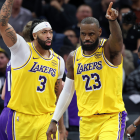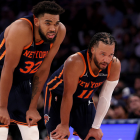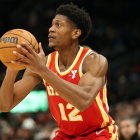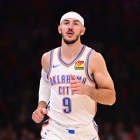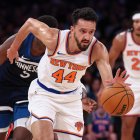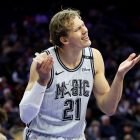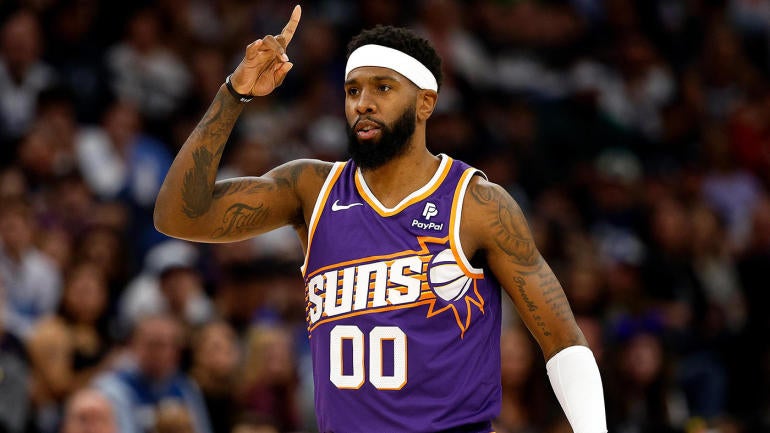
Royce O'Neale had the Phoenix Suns over a barrel the moment they traded for him at February's deadline. Because of the CBA's new second apron, Phoenix was always going to enter this offseason with no means of paying external free agents more than a minimum salary. They could either meet O'Neale's salary demands or lose him for nothing after paying three second-round picks and a (secondhand) first-round swap to get him. And so, they reportedly extended him for $44 million over four years on Saturday, according to ESPN's Adrian Wojnarowski. Another key 2024 free agent, Grayson Allen, had the Suns in the same position during the season. He extracted a four-year, $70 million extension out of them then.
The result of the aggressiveness of the new owner, Mat Ishbia, is an absolutely historic payroll. Assuming they fill their three final roster spots with veterans on minimum salary deals and make no other changes, Phoenix will enter next season with the second-highest combined payroll ever and a luxury tax bill at roughly $389 million, according to Yossi Gozlan's projections, only trailing last season's Golden State Warriors at $394 million. Don't worry, fans of historic spending. Next year's Suns will blow those Warriors out of the water. Let's take a look at Gozlan's projection for Phoenix's 2025-26 balance sheet.
What's even crazier is the Phoenix Suns 2025-26 payroll projection. Their payroll and tax are projected to exceed $500 million next season.
— Yossi Gozlan (@YossiGozlan) June 29, 2024
That's because starting next season, tax rates increase by an additional $1 after the third tax level. Also, they'll be entering the… https://t.co/AvpUnO3JAZ pic.twitter.com/yEDPpo26Hk
No, your eyes aren't deceiving you. If Phoenix goes into the 2025-26 season with the 10 players it currently has under contract (which includes a team option on David Roddy) along with four veteran's minimum deals, they would be paying nearly $526 million in total salary and luxury taxes. That would make the 2025-26 Suns, barring some other team's surprise move ahead of them in the short-term, the NBA's first half-billion-dollar team.
So, why would the Suns be so expensive? As Gozlan notes, starting in the 2025-26 season, the luxury tax formula is going to change in a way that punishes repeat payers and teams that spend deep into the tax far more than the old system does. The Suns obviously check both boxes. The tax is calculated on a tiered basis. Essentially, the deeper you go into the tax, the more taxes per dollar above the tax line you have to pay.
Under the old system, the repeater tax started at $2.50 for every $1 above the line a team spends within the first $5 million. That figure then goes up to $2.75 for the next $5 million after that, $3.50 after that, $4.25 after that, and then, for every additional $5 million tier, the tax rate increases by another 50 cents per dollar. This is already a prohibitively expensive system, but it's about to get much more expensive.
The new repeater tax penalty starts at $3 for every $1 above the tax line a team spends within the first bracket. The next bracket goes up only to $3.25... but after that, it goes up to $5.50, then $6.75, and then, finally, it adds another 50 cents per dollar at each additional bracket after that. In the past, these brackets were fixed in $5 million increments. Moving forward, they will increase at the same rate that the cap does, so this will buy teams a bit more breathing room as they climb up the board. However, the higher tax rates are so prohibitively high that they are going to wind up costing teams like the Suns more money than ever.
Could the Suns trade away players to save money here? Sure. Declining Roddy's team option would be a nice start, for instance. But otherwise? Well, it's not going to be as easy as shedding money usually is. Bradley Beal has a no-trade clause. The Suns couldn't dump him without his permission, even if they had a suitor lined up. O'Neal and Jusuf Nurkic will both be in their 30s, earning eight-figure salaries and may not be especially desirable to other teams. Kevin Durant will be 37 entering the 2025-26 season, and while he's good enough to draw offers, they likely won't come close to the enormous price the Suns paid to get him. Trading Devin Booker would save the Suns plenty of money. Of course, then they wouldn't have Devin Booker, and he's really the only thing this group has to be excited about in the long term.
So, could the Suns avoid the dubious distinction of becoming the NBA's first half-billion-dollar team? Sure. But even if they do, barring a total rebuild, they are probably going to at least become the most expensive team in NBA history in the near future. That might be worthwhile if they genuinely contend for the championship, but after last season's first-round disappointment, that doesn't seem likely. Ishbia paid $4 billion to buy the Suns, and at this right, and at this rate, it may not be too long before he exceeds that figure in payroll alone.










